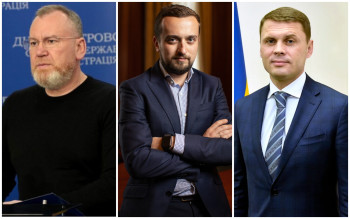Media: Incumbent top official at Ukraine's Defense Ministry supported Russia in Crimea.
Oleksandr Liyev, an incumbent top official at Ukraine's Defense Ministry, has supported Russia and its proxies in Ukraine's annexed Crimea peninsula, according to media reports.
The Defense Ministry and Liyev have not commented on the reports yet. The ministry did not respond to a request for comment.
The media reports were cited on Jan. 31 by Vitaly Shabunin, head of the Anti-Corruption Action Center's executive board.
Liyev has been acting head of the Defense Ministry's department in charge of developing the country's armament capabilities and procuring weapons since the summer of 2022.
Liyev has a controversial background.
In 2006 he organized protests against the Ukrainian Navy when Ukraine had a dispute with Russia over the division of the Soviet Black Sea Fleet, according to media reports cited by Shaninin.
He was also Crimea's tourism minister under pro-Kremlin President Viktor Yanukovych.
In 2013 Liyev was awarded a medal by the head of the Russian imperial house and wrote "I serve my homeland!" in an apparent reference to Russia, according to a Liyev post on social media cited by Shabunin.
In March 2014, when Crimea had already been invaded by Russian troops, Liyev called for "legalizing" Russia's fake referendum on the status of Crimea and holding it under joint Ukrainian-Russian supervision, according to an interview with Liyev published by Hromadske television. He also identified himself as "mentally Russian" in the interview.
He was fired from his ministerial position by the illegal Russian occupation government in Crimea in 2014 but promised to help the occupation authorities, according to media reports cited by Shabunin.
Ukraine's Defense Ministry has fallen under criticism amid a corruption scandal earlier in January.
On Jan. 23, the National Anti-Corruption Bureau of Ukraine (NABU) said that it had begun investigating possible corruption in the Defense Ministry’s food procurement.
The statement followed an investigation by Ukrainian news outlet ZN.UA, which alleged that the Defense Ministry was buying food for soldiers at inflated prices, indicating a possible corruption scheme. The ministry denied the accusations.










